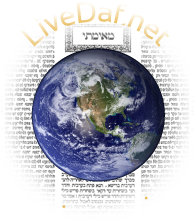Click here to view text of Daf (can be minimized to view alongside player)
Diagram 1 Diagram 2 Diagram 3 Diagram 4
Today’s Daf Yomi Question:
Rava and Ravina teach us that when designated for hatmanah, even shearings of wool lose their Muktzah status and can be moved on Shabbos. How does this concur with the opinion (of Rav) later on that a Muktzah object requires a ‘Maaseh’ (an act of enabling it for permissible use) in order to nullify its Muktzah status?
Click here to reply / view answers

Hello, lichvod haRav,
1. On today’s daf (50a in the middle), R’ Chanina ben Akiva instructed his students that to make the muktze firewood permissible, they should “tzu v’chashvu (go out AND intend)” to make the firewood designated for Shabbos use and hence no longer muktze. Ze’eri goes on to explain that this tanna applied this ruling as a leniency in a case of harried persons at a wedding or funeral, but in regular situations, a maase (act) would have to be performed on the firewood to make them not muktze (in accordance with the Tanna Kamma).
But this explanation of the sugya seems to suggest that R’ Shimon ben Gamliel’s opinion was followed in a case of necessity, yet R’ Shimon himself holds that mere designation is necessary (no act). If so, why did R’ Chanina have to say “TZU V’Chashvu”? Wouldn’t all that be necessary to say is “CHASHVU”? Why did the students also have to go out?
May I humbly suggest that either R’ Chanina is explaining that according to R’ Shimon, designation is not enough UNLESS THE DESIGNATOR CAN SEE WHAT HE’S DESIGNATING; or alternatively, R’ Chanina is not actually applying R’ Shimon as a leniency in this case, but rather is making a compromise ruling of both the Tanna Kamma and R’Shimon in the instance of tirda (harriedness), whereby the act of GOING OUT is sufficiently considered an “act” according to the Tanna Kamma.
In terms of halacha l’maaseh, do we follow R’ Shimon ben Gamliel? And if so, does one have to SEE what he’s designating as non-muktze or can he do this not in proximity to the item?
2. On today’s daf (50b at the end), the gemara discusses the permit to extract vegetables/slikusta plants from the soil (and the maskana explain that this is even when the plant hadn’t formerly been extracted). Why isn’t this a violation of choreish? Isn’t this just as forbidden as lifting up a potted plant from off the ground?
Thanks so much
Hi,
1) That’s a very nice diyuk – in halacha we rule according to the lenient opinion that merely using the object is sufficient. Otherwise, machshavah will do. The reason why he needed to tell them ‘tzeu’ is similar to what you said – you can only designate something specific, he needs to know exactly what he is designating, therefore he needs to see it first.
2) The Magen Avraham explains that the reason why it is permitted is due to several combined factors: a) It is eino miskaven b) it is melacha sh’eino tzarich legufo c) it is mekalkel d) it is kil’achar yad.
Rav doesn’t hold that it needs the kind of Maase that is required by making something into a Keli to be Mekabel Tuma, as Tosafos pointed out on Daf 49b. The Maase that Rav requires is a strong Yichud. The Gemara says on bottom of this Amud that when there is nothing more to do physically to show its new purpose then merely designating it would suffice.
I think it is safe to say that the shearings of wool wrapped into a box shouldn’t be worse off than a tied bundle of sticks.
The straw laid out on a bed is also considered a Maase when he had in mind to use it for that purpose. That Mishna was talking about when it was put there not for that purpose, as Rashi points out. That’s why it is worse than being Meyached without a Maase.
Rava’s Chidush here is that by putting the wool into the box you are redefining its function. Abaye, in the beginning of this Perek, who might be arguing with Rava (see Tosafos there), holds that you never gave up its original usage. In that case, even according to Shmuel it remains Muktza.